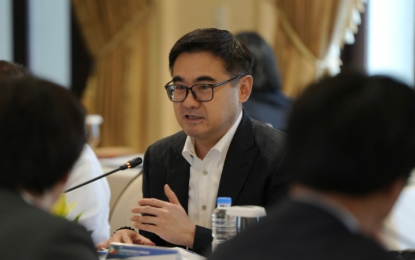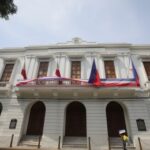MANILA – The government will carefully study a proposal to grant a one-month tax holiday to help boost public confidence and ease the burden on Filipinos amid corruption investigations.
Special Assistant to the President for Investment and Economic Affairs Secretary Frederick Go said the measure must undergo a thorough review by the Department of Finance and the Department of Budget and Management before any decision is made.
“This is a new proposal. It must be studied carefully by the DOF and the DBM. This is quite a big matter, and I think it’s best to give the DOF and the DBM time to carefully study this proposal,” Go said in a Palace press briefing.
The idea of suspending tax collections for a month was floated earlier, saying it could help lift public morale and stimulate spending amid concerns over alleged corruption in flood control projects.
When asked if he agreed with the logic behind the proposal, Go said it would be premature to take a position without full analysis.
“I’d like to defer this matter to the Department of Finance and the DBM because this really has to be studied carefully. I would hesitate to make a response that’s probably not very well thought about,” he said.
Go, who heads the government’s investment promotion efforts, stressed that the administration remains focused on maintaining fiscal discipline while implementing reforms to make the business environment more competitive.
The Palace official noted that the government is pursuing programs like the Corporate Recovery and Tax Incentives for Enterprises to Maximize Opportunities for Reinvigorating the Economy Act, the Public-Private Partnership Code, and Green Lanes for Strategic Investments to attract investors and sustain growth.
“These programs are meant to ensure that reforms remain sound, sustainable, and credible to both local and foreign investors,” Go said.
Department of Finance
The Department of Finance is a government agency responsible for managing a nation’s revenue, budget, and economic policy. Its history is tied to the formation of the modern state, evolving to oversee taxation, public spending, and financial regulation to ensure economic stability and fund government operations.
Department of Budget and Management
The Department of Budget and Management (DBM) is the Philippine government’s executive body responsible for the sound and efficient use of public resources. It was formally established as an independent department in 1936, evolving from earlier budget offices to strengthen national fiscal management. Its primary function is to formulate the President’s annual budget and ensure government agencies use their funds effectively.
Corporate Recovery and Tax Incentives for Enterprises to Maximize Opportunities for Reinvigorating the Economy Act
This is not a place or cultural site, but a piece of U.S. legislation. The Corporate Recovery and Tax Incentives for Enterprises to Maximize Opportunities for Reinvigorating the Economy Act, more commonly known as the CREATE Act, is a 2021 Philippine law designed to reform the corporate tax system and provide fiscal incentives. Its history and purpose are to attract foreign investment, boost economic growth, and make the Philippines more competitive with its Southeast Asian neighbors.
Public-Private Partnership Code
The Public-Private Partnership (PPP) Code is not a physical place or cultural site, but a legal and regulatory framework. It is a set of rules and guidelines established by governments to facilitate and govern collaborations between public agencies and private sector companies for financing, building, and operating public infrastructure and services. Its history is rooted in the late 20th century as governments sought private investment and expertise to develop projects like roads, hospitals, and utilities more efficiently.
Green Lanes for Strategic Investments
“Green Lanes for Strategic Investments” is not a physical place or cultural site, but a policy initiative. It was launched by the European Commission in 2020 to fast-track permitting and support for strategic green and clean-tech projects. The goal was to accelerate the EU’s transition to a green economy by removing administrative bottlenecks for key investments.






